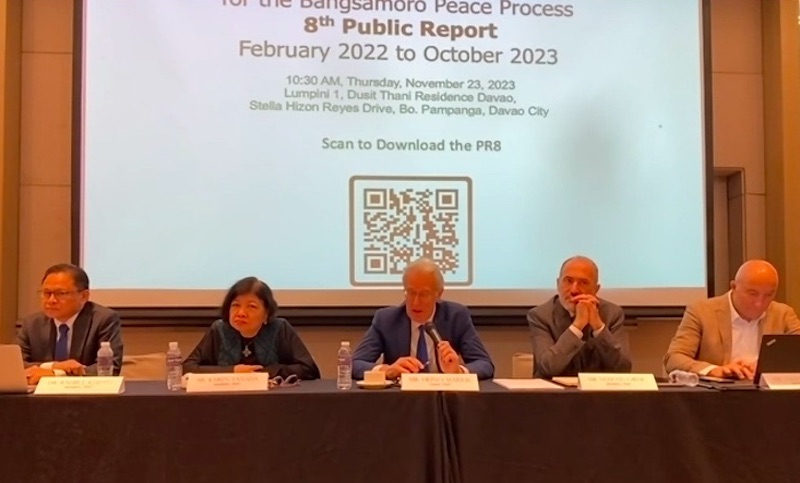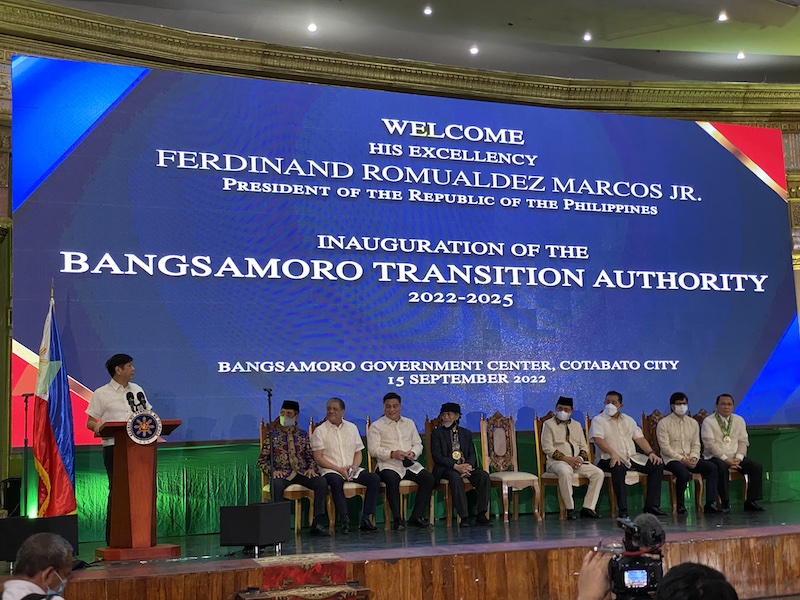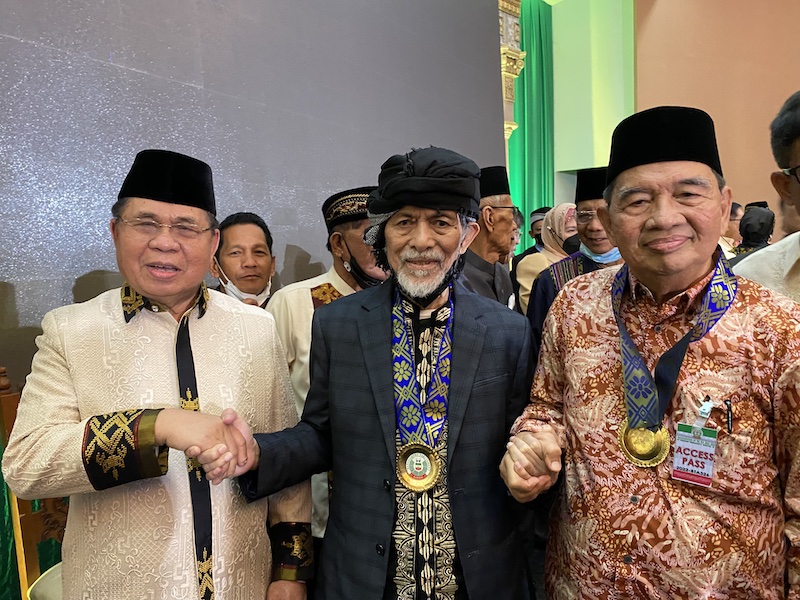DAVAO CITY (MindaNews / 23 November) – The Comprehensive Agreement on the Bangsamoro (CAB), the peace agreement signed by the Philippine government and the Moro Islamic Liberation Front (MILF) in 2014, may not be fully implemented by June 30, 2025, the end of the six-year transition period in the Bangsamoro Autonomous Region in Muslim Mindanao, raising the possibility that no exit agreement will be signed by then, the Third Party Monitoring Team (TPMT) said.
“With many tasks still to be accomplished, in particular on the normalization track, full implementation of the peace agreements may not be complete with the end of the transition phase in 2025. This also raises the question whether it would be possible to conclude an exit agreement by 2025,” the 62-page 8th Public Report of the TPMT, the five-member team set up by the government and MILF to monitor the implementation of the peace pact, said. The report covered the period from February 2022 to October 2023.
Reckoned from the release of its report on November 23, 2023, there are only 19 months or 585 days left until the end of the transition period on June 30, 2025 and 18 months or 536 days to the first election of the 80-member Bangsamoro Parliament on May 12, 2025. The filing of certificates of candidacy is 11 months away, in October 2024.
 Heino Marius (center), chair of the Third Party Monitoring Team, and members (L to R) Rahib Kudto, Karen Tanada, Huseyin Oruc and Sam Chittick, at the presentation in Dusit Thani, Davao City of the 8th Public Report on the implementation of the Bangsamoro peace process.
Heino Marius (center), chair of the Third Party Monitoring Team, and members (L to R) Rahib Kudto, Karen Tanada, Huseyin Oruc and Sam Chittick, at the presentation in Dusit Thani, Davao City of the 8th Public Report on the implementation of the Bangsamoro peace process.
The end of the transition period in six-province BARMM, the regional government that succeeded the Autonomous Region in Muslim Mindanao (ARMM), marks the beginning of the three-year term of the elected officials, the first administration after a six-year transition period run by appointed officials and led by the MILF.
“I would say on the political track, we’re certainly above 50%; on the normalization track, we are lower than 50%,” TPMT chair Heino Marius said of the status of the CAB’s implementation in a press conference at the Dusit Thani hotel here Thursday morning.
Marius explained that the “full implementation (of the CAB) at the end of the transition phase is probably not going to happen” because “it will take more time to complete certain aspects” of the normalization process like the provision of socio-economic support to the combatants, amnesty, camp transformation, policing, among other components.
Normalization also includes redeployment of the military disbandment of private armed groups and transitional justice and reconciliation.
Marius said the question on whether or not an exit agreement can be signed before the transition period ends in 2025 ‘is “up to the parities.”
“They would have to discuss it,” he said. Marius said they have not been informed when the peace implementing panels will meet but they will be meeting with the parties soon.
Under the peace agreement, the exit agreement officially terminating the peace negotiations will be signed by both parties at the end of the transition period, “if and only when all agreements have been fully implemented.”
The parties to the agreement are the government and the MILF, the latter presently the party in power with 41 members in the 80-member Bangsamoro Transition Authority (BTA), the transition government in the lone region in the country with a parliamentary system.
By 2025, however, the political landscape will have changed and the MILF may no longer be the party in power. In 2005, a traditional politician, Zaldy Ampatuan of Maguindanao, won the governorship of the ARMM which the Moro National Liberation Front (MNLF) held for nine years, from 1996.
 President Ferdinand Marcos Jr. describes the inaugural session of the Parliament the Bangsamoro in Cotabato City on Thursday, 15 September 2022 as a “very, very important occasion” as it gathered the executive, legislative and judicial branches of government on the same stage with Bangsamoro leaders, apparently hoping everyone would be on the same page in the Bangsamoro peace process. MindaNews photo by CAROLYN O. ARGUILLAS
President Ferdinand Marcos Jr. describes the inaugural session of the Parliament the Bangsamoro in Cotabato City on Thursday, 15 September 2022 as a “very, very important occasion” as it gathered the executive, legislative and judicial branches of government on the same stage with Bangsamoro leaders, apparently hoping everyone would be on the same page in the Bangsamoro peace process. MindaNews photo by CAROLYN O. ARGUILLAS
MindaNews asked what the parties can do to ensure that the CAB can be fully implemented beyond June 30, 2025 and not end up like the previous peace agreements with the MNLF — the 1976 Tripoli Agreement and 1996 Final Peace Agreement — whose full implementation has been passed on across several administrations — from President Ferdinand Marcos Sr. until the present administration of President Ferdinand Marcos Jr.
Marius said they assume that the MILF, through its political party, the United Bangsamoro Justice Party (UBJP), will “continue to play an important role in the political scenario in the region beyond 2025.”
“They have a strategy to also conclude coalitions with some of the local political players,” he said.
He emphasized that implementing the peace agreement “represents a political commitment by Manila and by the MILF, therefore all sides even after 2025, all sides will do from our point of view or should do from our point of view, whatever is necessary to complete the implementation of the peace agreement because the peace agreement represents an important political commitment and they offer the opportunity to once and for all bring peace to a region of the Philippines which has over many decades suffered from continued unrest and armed conflict.”
“This is an opportunity not to be missed and should be taken. Therefore, the implementation of the CAB is absolutely essential for peace and development in the southern Philippines, he said.
If traditional politicians win majority of the seats in the 2025 elections, “they will also be interested in having a peaceful and stable Bangsamoro, they will also be interested in having development of all communities in the Bangsamoro. They should be interested in that and they should be working towards that. And they should pursue the commitment … which was taken by the MILF and which was also in some form transferred into the Bangsamoro Organic Law.”
Marius said traditional politicians are expected to commit to the full implementation of the CAB beyond 2025 “because it is in the interest, because these negotiations took place, because these agreements were concluded” and because the Bangsamoro Organic Law was passed by Congress, “we now have a different situation in the BARMM” in terms of resources through the block grant, through the Special Development Fund, through the agreements coursed through the Inter-Governmental Relations Board on the exploitation of natural resources in the BARMM, “so this is a new ballgame, so the new government which will be elected in 2025 has an interest to work on the basis of these new arrangements, to make it happen and to ensure that all communities of the Bangsamoro benefit from this new framework.”
“This is what we would hope and this is what we would expect to happen in 2025 no matter who will come out as the government in the first parliamentary elections in the BARMM,” he said.
Huseyin Oruc of the Turkey-based NGO, IHH Humanitarian Relief, recalled that when he joined the TPMT in 2013, the target to complete the implementation of the peace agreement was 2016 but it did not happen and so the target was 2019 but it also did not happen and did not happen again in 2022.
“But the peace process is going on,” he said.
He suggested that instead of focusing on the exit agreement, focus should be on continuity of the peace process.
Sam Chittick of The Asia Foundation, another member of the TPMT, noted the CAB has gone through three Presidential administrations – the signing of the CAB under Benigno Simeon Aquino III, the passage of the Organic Law for the BARMM and its establishment under Rodrigo Duterte and the “strong commitment” of President Marcos and his administration to complete the process. “There is a possibility to complete the process under this administration,” he said.
Karen Tanada of the Gaston Ortigas Foundation, noted the high quality performance of a number of women in the BTA, but said there are still “some mechanisms lacking women (participation).” She also cited efforts of the Bangsamore Women’s Commission and the launching of the regional action plan for Women, Peace and Security in the BARMM. She said they are still awaiting the passage of the Gender and Development Code which was among those promised by Chief Minister Ahod “Al Haj Murad” Ebrahim, the concurrent MILF chair.
Rahib Kudto, who represents the United Youth for Peace and Development (Unypad) said that under the normalization track, “only decommissioning is moving fast” while other elements are “very slow.”
“To effectively allow the combatants to return to civilian life, it is of paramount importance,” he said, to make them feel secure, “no more fear for their families, oppression, injustice…”
2 tracks: political and normalization
The Bangsamoro peace process has two tracks: the political which aims at ensuring meaningful self-governance for the Bangsamoro through the BARMM and normalization which focuses on the gradual normalization of conflict-affected areas and their transformation into peaceful and progressive communities.
The report noted “solid progress” in the political track while progress in the normalization track “has been comparatively slow.”
In the political track, the BTA passed two priority codes this year – the Electoral Code in March and the Local Governance Code, leaving only the Revenue Code among the five priority codes mandated by RA 11054, the Organic Law for the BARMM. The Indigenous Peoples Code has yet to be passed, too.
The TPMT also reported that all intergovernmental relations (IGR) mechanisms “are now operational.”
 Erstwhile estranged brothers in the Bangsamoro struggle (L to R) Ahod “Al Haj Murad” Ebrahim, Nur Misuari and Muslimin Sema are reunited at the inaugural session of the Bangsamoro Parliament on Thursday, 15 September 2022 in Cotabato City. Ebrahim is Chief Minister of the Bangsamoro Autonomous Region in Muslim Mindanao and chair of the Moro Islamic Liberation Front, Misuari is founding chair of the Moro National Liberation Front (MNLF) and Sema chairs a faction of the MNLF. MindaNews photo by CAROLYN O. ARGUILLAS
Erstwhile estranged brothers in the Bangsamoro struggle (L to R) Ahod “Al Haj Murad” Ebrahim, Nur Misuari and Muslimin Sema are reunited at the inaugural session of the Bangsamoro Parliament on Thursday, 15 September 2022 in Cotabato City. Ebrahim is Chief Minister of the Bangsamoro Autonomous Region in Muslim Mindanao and chair of the Moro Islamic Liberation Front, Misuari is founding chair of the Moro National Liberation Front (MNLF) and Sema chairs a faction of the MNLF. MindaNews photo by CAROLYN O. ARGUILLAS
It also noted that the 80-member BTA appointed by President Marcos, now includes the MNLF under MNLF founding chair Nur Misuari. This is the first time the MNLF-Misuari participated in the MILF-led body and Misuari even graced the inaugural session in Cotabato City in September 2022. It was only the MNLF under Sema-Jikiri that participated in the past. “A major boost for convergence” was how the TPMT described this in its report.
In the normalization track, 26,132 out of 40,000 combatants have been decommissioned and 4,625 of 7,000 firearms have been placed in the custody of the Independent Decommissioning Body (IDB).
Both parties hope to complete decommissioning before the May 2025 polls.
The report noted that the MILF “has not yet provided the list for the fourth and final phase which is necessary to reach the targeted number of 40,000.”
The effective provision of socioeconomic benefit packages for decommissioned combatants is still under discussion by the Parties, it said.
 Moro Islamic Liberation Front combatants in a military formation at Camp Darapanan in Sultan Kudarat town, Maguindanao. Decommissioning of combatant’s and firearms is ongoing. MindaNews file photo by BONG S. SARMIENTO
Moro Islamic Liberation Front combatants in a military formation at Camp Darapanan in Sultan Kudarat town, Maguindanao. Decommissioning of combatant’s and firearms is ongoing. MindaNews file photo by BONG S. SARMIENTO
The report also cited the start of the recruitment process for MILF and MNLF combatants, into the police. Out of 11,075 applicants who passed the Special Qualifying Eligibility Examination for MILF and MNLF members, 7,145 passed but only 400 slots have been allotted as recruitment quota for MILF and MNLF in 2023.
On amnesty for crimes perpetrated in pursuit of political beliefs, the period to file amnesty applications under Presidential Proclamations issued in February 2021 has expired. President Marcos named the members of the National Amnesty Commission in January 2023. “At the time of finalizing this report the NAC had not yet started to work on individual cases in anticipation of revised Presidential Proclamations to extend the application period,” the TPMT said.
It noted that a “swift resolution of amnesty cases” is particularly important for MILF members, including some already serving as BTA Members of Parliament (MPs) “who have cases filed against them and who intend to run as candidates during the 2025 elections.” (Carolyn O. Arguillas / MindaNews)
